Table of contents
- Introdução
- What is scaling?
- The difference between professional and home cleaning
- Tartar: a persistent problem
- The importance of plaque
- The scaling process
- Teeth cleaning: duration and qualified professionals
- The scaling procedure step by step
- Is it painful? Anaesthetic options available
- Recommended scaling frequency
- Benefits beyond aesthetics: prevention and oral health
1. introduction
Scaling is an essential procedure for regenerating oral health. In this article, we’ll explore all the details about this invigorating process.
2. What is scaling?
Scaling is the process of effectively removing plaque and tartar, reducing the build-up of bacteria, relieving gum inflammation and facilitating the daily cleaning of teeth. It is an indispensable treatment for maintaining a healthy mouth.
3. The difference between professional and home cleaning
Although daily oral hygiene is fundamental, a professional cleaning by a specialist makes all the difference. In this type of procedure, specific equipment and techniques are used to ensure the correct removal of bacterial plaque and tartar. In addition, the teeth go through a polishing process with specialised paste.
4. Tartar: a persistent problem
Tartar is a mineralised substance that forms when plaque is not removed properly. Its solid surface makes plaque removal difficult with home methods like brushing and flossing. Scaling is the only procedure that can completely eliminate tartar.
5. The importance of bacterial plaque
Plaque is a film containing bacteria, bacterial by-products and saliva. This substance, when not removed, produces acids that damage tooth enamel. Scaling is essential for the prevention of oral diseases caused by plaque.
Scale

6. The scaling process
Scaling is performed by a qualified dentist or oral hygienist. The procedure involves the use of specialized instruments, such as ultrasonic tips and hand-held curettes, to remove tartar from the teeth. In more difficult cases, a bicarbonate spray may be used to remove stubborn stains.
7. Cleaning teeth: duration and qualified professionals
A teeth cleaning, including scaling, usually takes thirty to sixty minutes. The duration varies according to the amount of tartar and plaque to be removed. This procedure can be performed by dentists or oral hygienists, professionals trained to prevent and treat oral diseases.
8. The scaling procedure step by step
During scaling, the teeth are thoroughly examined, and tartar is removed with the appropriate tools. The process includes the use of scaling and polishing techniques to leave the teeth clean and bright. Upon completion, the dentist will provide guidance on proper care to maintain oral health.
9. Is it painful? Anaesthetic options available
Scaling back is usually painless, but if you have sensitivity, the professional may apply topical or local anaesthetic to the areas to be treated, providing greater comfort during the procedure.
10. Recommended frequency of scaling
It is recommended to perform scaling regularly as part of the prevention of oral diseases such as caries, gingivitis and periodontitis. In addition, it is advisable before cosmetic procedures such as teeth whitening, fillings and ceramic veneers to ensure a more effective and long-lasting result.
11. Benefits beyond aesthetics: prevention and oral health
In addition to providing a more beautiful smile, scaling offers a number of oral health benefits. Proper removal of tartar and plaque helps prevent periodontal disease, tooth decay and other complications. Schedule your scaling regularly and enjoy a healthy and radiant mouth.
We hope this article has answered your questions about scaling. Take good care of your oral health and enjoy all the benefits of a healthy and dazzling smile!



